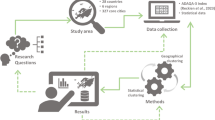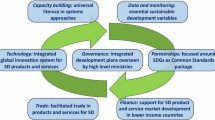Abstract
The 2030 agenda for sustainable development adopted in September 2015 advocates for a balanced integration of the economic, social and environmental dimensions of sustainable development. Existing multilateral environmental agreements (MEAs) can provide guidance for policy-makers to promote inclusive and sustainable economic growth, within safe ecological limits. This paper presents a practical approach to mainstream international obligations of MEAs with national development priorities and strategies. It identifies pathways of policy coherence from national strategies to specific instruments and indicators to advance implementation of MEAs and help counties to fulfill agreed obligations. The approach is grounded in the driving forces–pressure–state–impact–response (DPSIR) framework, and it was applied in two national and two regional case studies in the Caribbean. The outcomes from the case studies show that mainstreaming rate of MEAs is low, and linkages across multiple MEAs are rarely considered. The DPSIR framework was useful for addressing national development priorities and those of MEAs in tandem, through adopting a cross-sectoral, multistakeholder perspective. The research shows that addressing environmental degradation and improving MEAs’ implementation requires that international and regional agencies identify linkages among MEAs to assist in creating policy coherence to ensure their integration into national strategies by connecting with policies and strategies in tandem implementation of MEAs for national policy-makers to work with.




Similar content being viewed by others
References
Bizikova, L., Metternicht, G., & Yarde, T. (2015). Advancing environmental mainstreaming in the Caribbean Region: The role of regional institutions for overcoming barriers and capacity gaps. Sustainability, 7, 1–20. doi:10.3390/su70x000x.
Borja, A., Galparsoro, I., & Solaun, O. (2006). The European Water Framework Directive and the DPSIR: A methodological approach to assess the risk of failing to achieve good ecological status. Estuarine, Coastal and Shelf Science, 66(1–2), 84–96.
Caribbean Community (CARICOM). (2012). Caribbean MEA ratification status.Capacity building related to multilateral environmental agreements (MEAs) in African, Caribbean and Pacific (ACP) Countries: ratification status of major multilateral environmental agreements (MEAs) in Caribbean ACP Countries. Guyana: CARICOM Secretariat.
Caribbean Natural Resources Institute (CANARI). (2008). Report on Caribbean component of IIED’s user guide to effective tools and methods for integrating environment and development. Guyana: CARICOM.
Coffey, A., & Atkinson, P. (1996). Making sense of qualitative data. Thousand Oaks, CA: sage.
Cornell, S., Berkhout, F., Tuinstra, W., Tabara, J. D., Jager, J., Chabay, I., et al. (2013). Opening up knowledge systems for better responses to global environmental change. Environmetal Science and Policy, 28, 60–70.
Crossen,T. E. (2003). Multilateral environmental agreements and the compliance continuum. Bepress legal series 36.
Dalal-Clayton, D. B., & Bass, S. (2009). The Challenges of Environmental Mainstreaming Environmental Governance Series, No. 1. London: International Institute for Environment and Development.
European Environment Agency (EEA). (2010). State and pressures of the marine and coastal Mediterranean environment. Environmental Assessment Service, 5, 137.
Gray, K. R. (2000). International environmental impact assessment: Potential for a multilateral environmental agreement. Colorado Journal of International Environmental Law and Policy, 11(1), 83–128.
Intergovernmental Panel on Climate Change (IPCC). (2012). Summary for policymakers. In C. B. Field, V. Barros, T. F. Stocker, D. Qin, D. J. Dokken, K. L. Ebi, M. D. Mastrandrea, K. J. Mach, G.-K. Plattner, S. K. Allen, M. Tignor, & P. M. Midgley (Eds.), Managing the risks of extreme events and disasters to advance climate change adaptation (pp. 1–19). New York: Cambridge University Press.
Karageorgis, A. P., Skourtos, M. S., Kapsimalis, V. A., Kontogianni, D., Skoulikidis, N Th, Pagou, K., et al. (2005). An integrated approach to watershed management within the DPSIR framework: Axios River Catchment and Thermaikos Gulf. Regional Environmental Change, 5, 138–160.
Kok, M. T. J., & de Coninck, H. C. (2007). Widening the scope of policies to address climate change: Directions for mainstreaming. Environmental Science and Policy, 10, 587–599.
Müller, F., & Burkhard, B. (2012). The indicator side of ecosystem services. Ecosystem Services, 1, 26–30.
Naylor, L. A., Coombes, M. A., Venn, O., Roast, S. D., & Thompson, R. C. (2012). Facilitating ecological enhancement of coastal infrastructure: The role of policy, people and planning. Environmental Science and Policy, 22, 36–46.
OECD (2008) OECD Ministerial declaration on policy coherence for development. Adopted by ministers of OECD countries at the Ministerial Council on 4 June 2008, C/MIN(2008)2/FINAL.
OECD. (2012) Policy Framework for Policy Coherence for Development. OECD Working paper no 1, Paris: OECD.
Sietz, D., Boschutz, M., & Klein, R. (2011). Mainstreaming climate adaptation into development assistance: Rationale, institutional barriers and opportunities in Mozambique. Environmental Science and Policy, 14, 493–502.
Soussan J. (2007). Making mainstreaming work. An analytical framework, guidelines and checklist for the mainstreaming of Marine and Coastal Issues into National Planning and Budgetary Processes. Prepared for the coordination office of the global programme of action for the protection of the marine environment from land-based activities (GPA) of the United Nations Environment Programme (UNEP). The Hague: UNEP/GPA Coordination Office.
UNEP. (2010). Latin America and the Caribbean-Environment outlook. Panama City: United Nations Environment Programme.
United Nations Conference on the Human Environment (1972). In Report of the United Nations conference on the human environment. U.N. Doc. A/CONF.48/14, 1972, 11 I.L.M. 1416.
United Nations Convention to Combat Desertification (UNCCD) (2012) Land degradation neutrality resilience at local, national and regional levels. 23 pages. Bonn, Germany. http://www.unccd.int/Lists/SiteDocumentLibrary/Publications/Land_Degrad_Neutrality_E_Web.pdf
United Nations Environment Programme (UNEP). (2009). Mainstreaming poverty-environment linkages into development planning: A handbook for practitioners. Nairobi: UNDP-UNEP Poverty-Environment Facility, UNEP.
United Nations Environment Programme (UNEP). (2010). Auditing the implementation of multilateral environmental agreements (MEAs): A primer for auditors. Nairobi: UNEP.
United Nations Environment Programme (UNEP). (2012). Global environment outlook 5: GEO5: Environment for the future we want (5th ed.). Nairobi: United Nations Environment Programme.
Acknowledgements
The authors would like to thank the participants in the case studies for their valuable inputs and colleagues from CARICOM and IISD for their assistance with this study. This research was undertaken in the Small Island Development States of the Caribbean (Caribbean SIDS), within the framework of a program for capacity building in the African, Caribbean and Pacific (ACP) countries commissioned by the European Commission.
Author contributions
The individual contribution and responsibilities of the authors were as follows: Livia Bizikova: research design, grant holder of research financing, participation in the interviews, workshops and related data collection, data analysis, supervision of data collection and analysis, article writing. Graciela Metternicht: literature review, participation, data analysis, article writing and formatting.
Author information
Authors and Affiliations
Corresponding author
Ethics declarations
Conflict of interest
The authors declare no conflict of interest.
Rights and permissions
About this article
Cite this article
Bizikova, L., Metternicht, G. & Yarde, T. Environmental mainstreaming and policy coherence: essential policy tools to link international agreements with national development—a case study of the Caribbean region. Environ Dev Sustain 20, 975–995 (2018). https://doi.org/10.1007/s10668-017-9924-x
Received:
Accepted:
Published:
Issue Date:
DOI: https://doi.org/10.1007/s10668-017-9924-x




